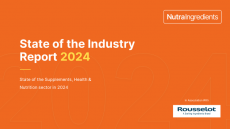Frutarom USA launches salvia seed omega-3
US where it says ALA is not getting enough attention.
Frutarom USA announced the launch of its salvia-derived oils for use as a vegetarian source of the fatty acids.
The company is pushing forward its branded line, Alina, as a source of the omega-3 ALA (alpha-linolenic acid) that has lost out to DHA (docosahexaenoic acid) in scientific literature on healthy lipids.
"We're missing a big piece of the puzzle on the benefits of ALA," Jennifer Czerner, technical business manager with Frutarom USA, told NutraIngredients-USA .
"Your body cannot supply ALA."
The omega-3 ingredient market is divided into two camps, with the makers of marine-derived ingredients proclaiming the benefits of DHA on one side and the manufacturers of ALA touting anti-inflammatory benefits on the other.
EPA (eicosapentaenoic acid) and DHA are derived from marine sources such as oily fish, and DHA can also be derived from microalgae.
ALA is derived from plant sources such as salvia or flaxseed.
While EPA and DHA are 20- and 22-chain chain carbons respectively, ALA is an 18-carbon.
Some of the cognitive, heart health and antioxidant benefits are believed to be lost in the conversion process elongating ALA's carbon chain.
Czerner says the bioavailability of ALA and how it converts to DHA and EPA in the body depends on the conversion rate as it is affected by age, gender and health.
The company will now push forward ALA as a vegetarian source of ALA particularly suited to use in functional food.
"While it's true that there are other vegetable sources of omega-3, such as flaxseed, canola and walnuts oils, these sources are less stable toward oxidation," said Laurent Leduc, vice president, marketing and business development.
Alina is a patented plant source of omega-3 fatty acids from the salvia seed which is derived through a natural extraction process.
"Alina has a more neutral flavor profile, allowing for fortification without negative taste or texture impact," said Leduc.
"Alina offers greater stability in baked goods, bread, dairy, cereal and wide range of beverage products such as health drinks."
Other health benefits of ALA, according to Frutarom, include a reduction in stroke risk, addressing ADHD conditions in children, improving cognitive function and supporting eye health.
Alina has already been used successfully in functional dairy products in Israel.
Frutarom says dairy producer Tara experienced a 400 percent increase in its market share following its promotional campaign for a milk product using Alina in combination with calcium and vitamin D fortifiers.
The company is hoping the ingredient will take part in a similar success in the North American market.
"Dairy is driving the functional foods market worldwide," said Czerner.











